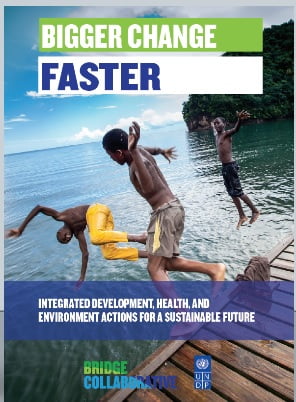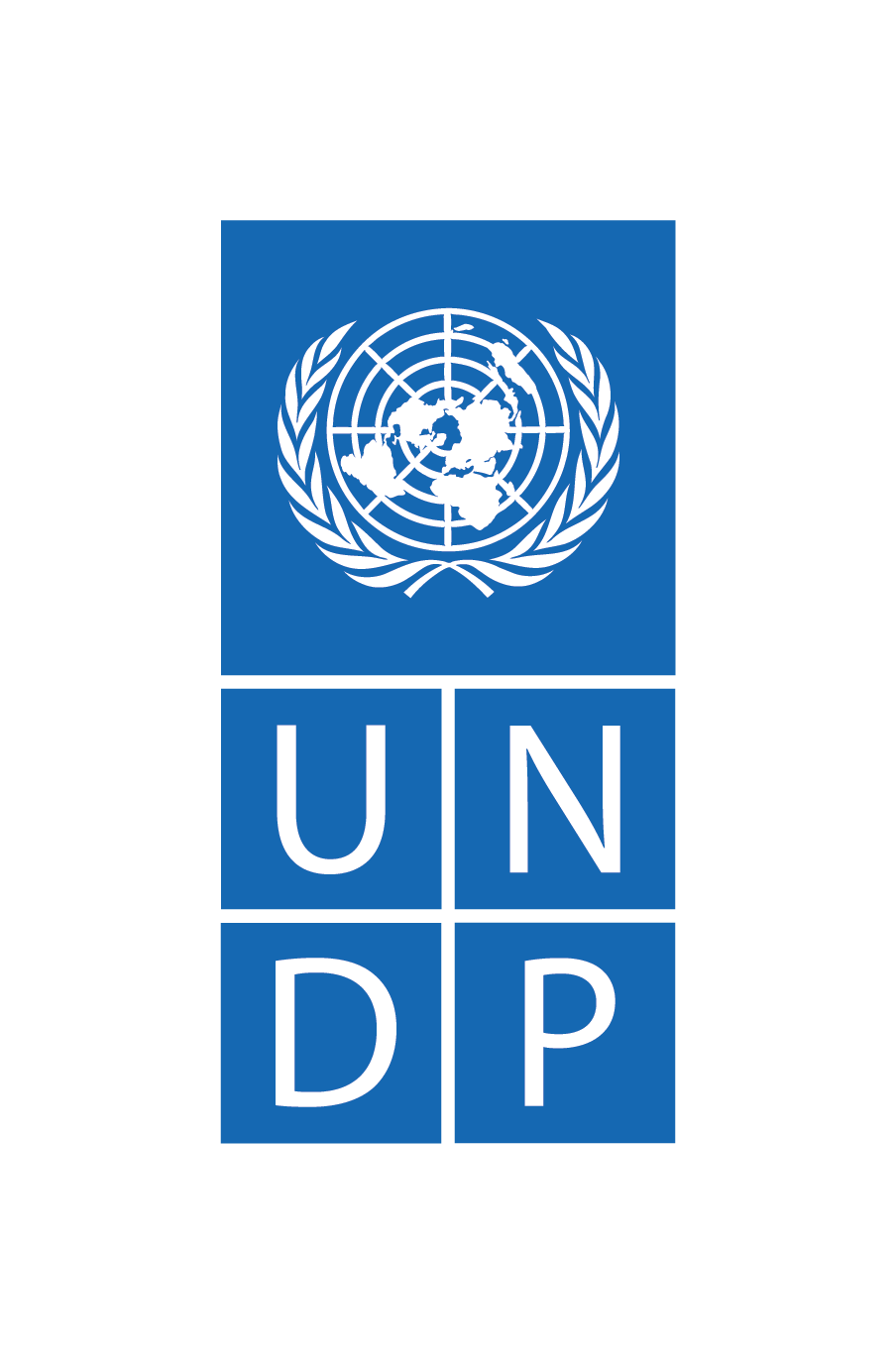Strengthening systems for the health of people and planet
Overview
Climate change is the greatest health threat of the 21st century, with environmental factors accounting for a quarter of the global burden of disease (The Lancet 2018; World Health Organization 2016). At the same time, the health sector is a major contributor to the global climate crisis and environmental degradation. If the global health sector were a country, it would be the fifth largest emitter of greenhouse gases in the world (Health Care Without Harm 2020). These multi-directional linkages between health and planet underscore the need for integrated action that simultaneously safeguards human health and the natural environment, a focus called for by the trans-disciplinary field of ‘planetary health.’
With its large policy and programmatic portfolios on health, environment, climate change mitigation and adaptation, governance, and other connected areas, UNDP is uniquely placed to support multi-sectoral policies and programmes on planetary health to respond to the complex and growing health burden caused by climate change, pollution, environmental degradation and threats to biodiversity, in partnership with the Global Fund to Fight AIDS, Tuberculosis and Malaria (Global Fund), the World Health Organization (WHO), the United Nations Environment Programme (UNEP), Global Environment Facility (GEF) and others.
UNDP’s approach
UNDP’s framing on planetary health is operationalized through two primary areas:
- supporting multi-sectoral policies to respond to the growing burden of environmental threats including pollution and climate change, with a particular focus on the most vulnerable.
- building resilience in the health sector, including through integration of measures for sustainability in health programmes.
UNDP’s approach to environmental sustainability in the health sector is aligned with the priorities of key partners, including the Global Fund to Fight AIDS, Tuberculosis and Malaria (Global Fund), Gavi, the Vaccine Alliance (Gavi) and the World Health Organization (WHO). The Global Fund encourages partner countries to develop and strengthen comprehensive, sustainable, climate-smart procurement, supply and waste management systems that support the avoidance, reduction and management of health-care waste, including health-care waste that is generated under Global Fund grants (GF RSSH Information Note 2019). Gavi is committed to scaling up its investments in proven interventions for climate-resilient health systems, including by helping countries to reduce their footprint related to health care, as underlined in its 2021–2025 Strategy.
UNDP works closely with WHO, particularly drawing on its expertise in building climate-resilient health systems and helping countries to track national progress in protecting health from climate change. This includes joint efforts to integrate health into the implementation of nationally determined contributions to the Paris Agreement. It likewise partners with civil society organizations, research institutes and foundations to expand research and multi-stakeholder participation, including youth, in movements linking health and climate. UNDP also helps to connect investments and expertise from environmental funding mechanisms such as the Global Environment Facility and Green Climate Fund with those of health-specific financing partners.
Along with the World Bank and the United Nations Department of Economic and Social Affairs (DESA), UNDP is a co-convener of the WHO-led Health and Energy Platform of Action, which mobilizes political commitment, support and resources to ensure universal access to clean and sustainable energy to protect health.
Resources and examples
Building resilience and reducing negative environmental impact through health programmes
Scaling renewable energy in the health sector
UNDP has supported 14 countries to increase access to high-quality health services through the installation of solar energy photovoltaic systems in some 1,150 health centres and storage facilities, primarily through its Solar for Health Initiative (S4H). Solar power systems are facilitating more reliable and sustainable health services, while mitigating the impact of climate change and reducing energy costs, even in some of the most challenging contexts. In many countries, UNDP’s S4H interventions are funded by the Global Fund to Fight AIDS, Tuberculosis, and Malaria (Global Fund) as part of joint efforts to build more resilient health systems. UNDP is also developing a new business model to maintain financial sustainability of the S4H initiative in the project countries. Learn more.
Greening health sector procurement
UNDP hosts the Inter-agency Task Team on Sustainable Procurement in the Health Sector, which aims to contribute to greener health systems and reduce greenhouse gases. It has influenced members’ procurement practices and developed tools to monitor performance of suppliers and manufacturers. In partnership with Health Care Without Harm, UNDP is also working with 10 countries through a Sustainable Health in Procurement Project (SHiPP) (2018-2021), supported by the Government of Sweden, to strengthen sustainability in health sector policies and practices. UNDP brings these approaches and expertise to its capacity development activities in countries where it is an interim Principal Recipient of Global Fund programmes or providing technical assistance to ministries of health to support the procurement of medicines and other health products.
Health-care waste management
Proper waste management reduces both environmental damage and health risk factors. UNDP’s capacity development to governments and partners for procurement and supply chain management includes support to strengthen processes and infrastructure, including installation of incinerators, for the management of pharmaceutical and other health care waste. In 2020 amidst the COVID-19 crisis, UNDP and Engineers Without Borders supported numerous countries to conduct rapid assessments of health-care waste systems and related legal and policy frameworks. This was done in close collaboration with national and local government ministries, environmental management agencies, healthcare facilities, civil society organizations and organizations from the private sector. The results are being used to develop national roadmaps and support broader programming, in line with grants from the Global Fund to Fight AIDS, Tuberculosis and Malaria (Global Fund) and sustainable health in procurement programmes. Read more here.
Resilient and sustainable COVID-19 response
To support equity, resilience and sustainability in the COVID-19 response and recovery, UNDP is working with governments, and the United Nations, and other partners under the framework on national deployment and vaccination plans to minimize the environmental and climate impacts of COVID-19 vaccination. Learn more here.
Technical assistance to support multi-sectoral policies
Embedding climate change adaptation strategies into health systems
Through a five-year project “Building Resilience of Health Systems in Pacific Island Least Developed Countries to Climate Change” (2021-2026), UNDP is providing technical assistance to the Ministries of Health in Kiribati, Tuvalu, Vanuatu and the Solomon Islands to strengthen the capacity of national health systems and institutions, and sub-level stakeholders, to manage long-term climate-sensitive health risks. The project is co-funded by the Global Environment Facility, the World Health Organization (WHO), and the respective Ministries of Health. Details of key project activities and outcomes are available on the project website. UNDP implements a similar regional project in Asia (Bangladesh, Cambodia, Lao People’s Democratic Republic, Myanmar, Nepal and Timor-Leste) to integrate climate risks into health sector planning, improve surveillance and early warning systems and integrate health into the national adaptation planning processes.
Addressing pollution as an environmental determinant of noncommunicable diseases
Through a three-year project “Advancing Health and Environmental Sustainability Through Action on Pollution” (2020-2023), UNDP and the European Commission support three governments – India, Mongolia and Ethiopia – to address pollution as a key environmental determinant of non-communicable diseases (NCDs), and as part of broader efforts to respond to environmental degradation and the changing climate. The objectives of the project are to: 1) develop and pilot a methodology to calculate NCD-related health costs of inaction on air pollution, and the return on investment in selected cost-effective and nationally-prioritised interventions (investment case); 2) enhance governance structures and coordination mechanisms across relevant ministries to enable joint analysis, planning and financing to target main sources of pollution; 3) advance effective laws, policies, standards and regulations around pollution and health through conducting legal environment assessments, and build capacities for oversight and enforcement where gaps exist, and 4) facilitate a global scale-up of action on pollution and health through dissemination of the methods, approaches, and lessons learnt.
Linking health and environment in impact assessments
UNDP has supported a number of countries in Africa to integrate HIV and key health- and gender-related priorities into national assessments of environmental impact, to inform development policy planning.
Scaling impact on health, climate, and environment through co-financing
UNDP supports the application of co-financing methodologies in countries’ implementation of the Sustainable Development Goals (SDGs). As part of its policy support, UNDP helps governments to prioritize high-value interventions that deliver impact across multiple SDGs, including health and environment, to combine financing streams from multiple ministries and better leverage existing resources. “Integrated policies that capture triple wins for health, growth and climate could reduce by 40 percent the required total investment to achieve the Sustainable Development Goals and the Paris Agreement, ” says– Yannick Glemarec, Executive Director, Green Climate Fund.
Key resources

Issue Brief: Planetary Health
United Nations Development Programme
This issue brief explores what is meant by planetary health, and how it can inform UNDP’s work at the nexus of environmental sustainability and climate change, disaster risk reduction, health, gender equality, and poverty alleviation.
PDF

Sustainable Health Procurement Guidance Note
United Nations Development Programme, SPHS, Sida
The main goal of this guidance note is to facilitate the implementation of sustainable procurement of health-care commodities and services by providing criteria that may be used by United Nations staff for the requisition and procurement of health products and services.
PDF

Bigger Change Faster: Integrated Development, Health, and Environment Actions for a Sustainable Future
United Nations Development Programme, Bridge Collaborative.
This joint report by UNDP and Bridge Collaborative highlights opportunities to accelerate multi-sectoral solutions in 1) clean air and energy; 2) global food system for health and sustainability; and 3) sanitation and wastewater improvements.
PDF

Operational Framework for Building Climate Resilient Health Systems
World Health Organization
This framework provides guidance on how the health sector and its operational basis in health systems can systematically and effectively address the challenges increasingly presented by climate variability and change.
PDF
